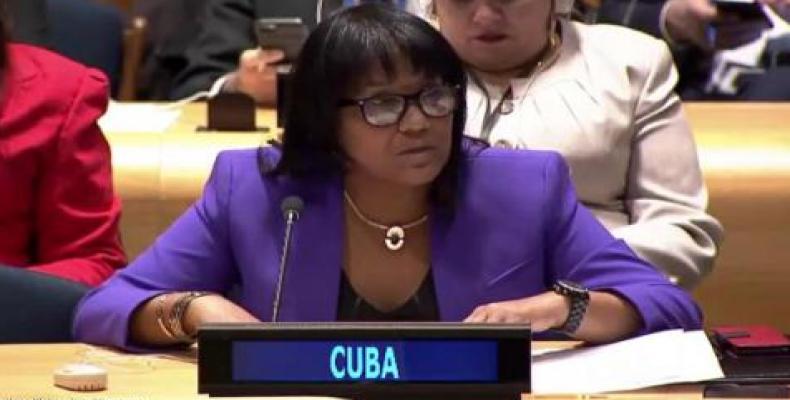New York, October 27 (RHC-Minrex)-- "We believe that the international community, particularly the developed countries, must honor their commitments and their ecological responsibility to humanity and future generations," Cuban Ambassador Anayansi Rodríguez Camejo, Permanent Representative of Cuba to the United Nations, said during the UN Economic and Social Council (ECOSOC) Meeting, "Impacts of Recent Hurricanes and Earthquakes: Implementing an Agenda 2030 based on risk assessment and resilience."
She also stressed the need to increase international cooperation and technology transfer to developing countries, without which there could be no significant progress in disaster risk reduction at the global level.
The Cuban Ambassador reiterated Cuba's sincere condolences for the recent natural disasters that have hit several regions of the world and said that the increasingly devastating and frequent clash of natural disasters confirm climate change as a threat to the survival of humanity, and the sustainable development of peoples.
She stressed the urgent need to implement and follow up on important international documents in this area, such as the Sendai Framework for Action on Disaster Risk Reduction; the Accelerated Action Modes for Small Island Developing States (SIDS) (Samoa Pathway); the Paris Agreement and Agenda 2030 for sustainable development, under the principle of common but differentiated responsibilities.
According to Rodriguez Camejo, aid and the transfer of knowledge and technology should be promoted to those countries and territories that, due to their geographical conditions and scarce resources, face the greatest challenges in the face of climate change. There is also a need to strengthen solidarity in international and regional cooperation and integration in disaster risk reduction, an area in which Cuba will continue to prioritize international collaboration in the widest possible sense, she said.
Cuba Calls on Developed Countries to Honor Ecological Responsibility to Humanity

Matérias relacionadas
Comentários
Deixe um comentário
Todos os campos são requeridosMais vistas
- Ministro das Relações Exteriores de Cuba denuncia que Israel está obstruindo a ajuda humanitária à Palestina
- Conselho de Ministros aprova o Programa do Governo para corrigir distorções e relançar a economia em 2025
- Ministro das Relações Exteriores rejeita novas medidas dos EUA contra Cuba
- Academia de Ciências de Cuba concede reconhecimento a Frei Betto
- Sheinbaum analisa progresso do Plano México

